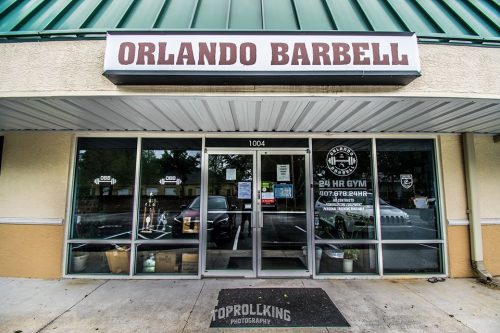
Are You Losing muscle?
I haven’t posted since this whole stay at home/quarantine started simply because I haven’t had anything to post about. Orlando Barbell, as with every other gym, has been forced to close down so not only have I lost all revenue from personal training (which is how I pay myself), I also lost almost all of my online clients since their gyms have closed as well. To top things off, the AC at the gym and my truck both died. So now, while I have even less income than usual, I had to pay $650 to get OBB’s AC fixed and am still driving around in a hot truck. However, I realize these issues are minor compared to those, and their families, who are dealing with the contraction of the Coronavirus or other serious issues.
As much as I understand the need to prevent the potential spread of this illness, I have a hard time rationalizing the government’s ability to shut down businesses so easily. In retrospect it will be interesting to see if the damage to the economy will be considered worth the reaction. Although we've had quite a few cancellations, thankfully the majority of the Orlando Barbell members have been supportive and continue to pay their membership dues.
As everyone struggles to find ways to train without access to their gyms it made me curious as to how much of an effect this will ultimately have on everyone’s strength and physiques, so I decided to do some research on the subject. Here’s what I found:
How long does it really take for your muscles to begin to atrophy?:
This is promising:
“Athletes can start to lose their muscle strength in about three weeks if they’re not working out, according to a 2013 study. Athletes typically lose less overall muscle strength during a break than nonathletes.
In general, you can take up to three or four weeks off without seeing a noticeable drop in your strength performance”
This article seems to support the same data:
“When it comes to muscular endurance, you can expect the residual training effect to last around 15 to 18 days, or a little more than two weeks. After that period, if you don't continue challenging your body enough to maintain those adaptations, your endurance will start to fade. For muscular strength, the residual training effect lasts longer — about 30 days.”
What is the minimum amount of exercise necessary to maintain muscle?
“Researchers placed subjects on a resistance-training program for 10 weeks. They were then assigned to one of two groups for a further six weeks. Group one lifted weights just once per week. Group two did so twice a week.
Subjects who trained only once per week were able to maintain strength in four of the six exercises they were tested on. Their performance in the leg press and leg curl actually improved.
if you’ve been lifting weights that limit you to somewhere between 5 and 8 repetitions, then make sure to keep the weight at or around that level.”
So, if you’re actually able to lift like you had been at least once a week during the break, then you’re good to go. Unfortunately, there’s a good chance that’s not the case. However, if one day a week of lifting can maintain your muscle, then my guess is that using bands, whatever weights you have available, or even just bodyweight exercises two to three times a week should be enough to maintain as well.
How long will it take to put muscle back on after a break?
“Whenever we strength train, our muscles acquire what is called myonuclei. These myonuclei are important when it comes to hypertrophy. Through further training and proper diet, these myonuclei synthesize new muscle proteins and thus, our muscle fibers grow larger.
Upon a significant duration of detraining, we may start to “lose” our muscles, and we get weaker and smaller. And yet, the myonuclei stays in the muscle–impressively, one study suggests that myonuclei can remain for 15 years or more in human muscles!
So what happens when you get back to training? Your muscles will rapidly grow in size because the step of adding nuclei is “skipped”–they’re already there, ready to synthesize muscle proteins and build muscle fibers all over again!
This is what the bodybuilding world refer to as muscle memory, and how most of us can come back stronger than ever."
How long will it take to gain back all of your lost muscles?
"The exact timeframe will vary in a case by case basis, dependent on factors such as your duration of detraining, training level, genetics, diet, and how effective your training scheme is at the moment.
As a ballpark number, you can expect to gain back all your lost muscles within 2-4 months of proper diet and training.”
How do I get started again?
My training is based off of percentages rather than rep ranges or perception. This gives specific and measurable numbers. Of course, after not training for a while, these numbers will decrease. I recommend basing your projected max off of 80 to 90% of your previous projected max to get started. If you’re not able to achieve the designated number of reps then decrease your projected max until you can.
Chances are the lack of training is going to take more of a toll mentally than physically. Yes, a period of detraining will suck since you’re destined to lose some muscle and strength, but the good news is that it will come back relatively quickly.
https://www.healthline.com/health/how-long-does-it-take-to-lose-muscle-mass#trained-athletes
https://www.ncbi.nlm.nih.gov/pubmed/23529287
https://www.ncbi.nlm.nih.gov/pubmed/23529287
https://www.livestrong.com/article/435701-how-long-can-you-go-without-exercise-before-your-body-starts-to-lose-muscle/
What’s The Minimum Amount Of Exercise You Need To Stay In Shape?
Stay in the Loop with the Powerloop!
The M2 Method Raw Training Ebook
The M2 Equipped Training Ebook
The Effective Floor Based Home GHR









